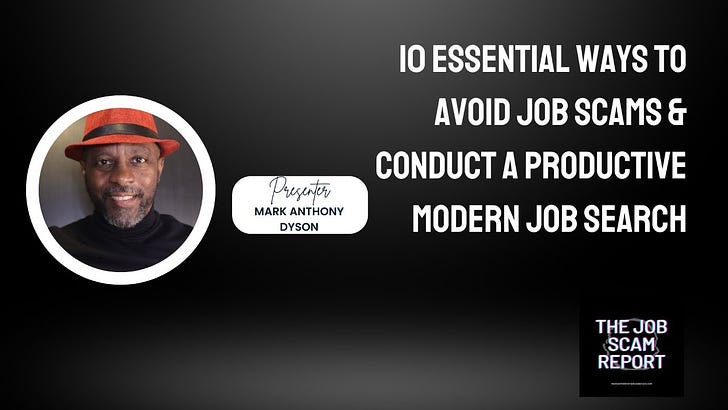In this week’s episode, I share the virtual presentation with Tewksbury Public Library in Tewksbury, MA. They had a great group of approximately 40 participants with engaging questions about scams. Like most groups I have spoken to this year, some detecting and avoiding experienced a job scam. We try to use these experiences as lessons of what to do, and what not to do.
I hope you recognize how job scams are a widespread issue affecting job seekers even if they have yet to fall victim. Scammers frequently exploit the Internet, using platforms like LinkedIn and Facebook to target vulnerable individuals with social engineering tactics.
We must be vigilant for signs of scams, such as fake profiles and misspellings, and share our experiences to help protect others. To avoid falling victim, plan to research thoroughly, verify emails, and be cautious about sharing personal information.
Importance of Awareness
- Scams are universal, affecting many job seekers.
- Romance scams and financial scams are prevalent.
- Job scams utilize common internet access tools.
- Scams are internet crimes; report them to ic3.gov.
Tracking and Reporting
- Use the Better Business Bureau scam tracking site.
- Scams occur across all platforms, including LinkedIn, Facebook, emails, and texts.
- Consider using apps like RoboKiller to manage scam calls.
Recognizing Scam Tactics
- Scammers use social engineering to target vulnerable individuals.
- Frank Abagnale: Scammers often have 98% of your information.
- Scams may seek personal information more than immediate cash.
Common Scam Signs
- Fake profiles mimic real recruiters and employers.
- Misspellings and errors often indicate scam sites.
- Scammers exploit the lack of victim’s knowledge.
- Sharing scam experiences can protect others.
10 Ways to Avoid Scams
1. Treat every company, recruiter, and hiring manager with caution.
- Research diligently to confirm legitimacy (although one red flag is often enough)
- Disengage if anything seems off.
2. Verify emails by checking the domain after the "@" symbol matches the company.
3. Be cautious of text and email communication from unknown sources.
4. Fake profiles: Check inconsistencies in activity and post history.
5. Avoid messaging app communications for transactions.
6. Do not provide personal information before an interview is concluded.
7. Avoid websites that are bare or poorly constructed.
8. Be wary of purchasing equipment or software from unknown sources.
9. Evaluate LinkedIn and other social media profiles for authenticity.
10. Be cautious of individuals claiming to be career coaches or resume writers.
Tools and Strategies
- Use Google Voice or YouMail to separate phone numbers.
- Utilize security tools like VPNs and antivirus software.
- Modern job search involves vetting and targeted applications.
- Use LinkedIn for networking and engagement.
- Trust your instincts and prioritize safety.
If you want to see the video, I’ve included it below so you can also view the accompanying PowerPoint.














Share this post